Ideologies and U.S. Foreign Policy International History Conference: Day 1 Coverage
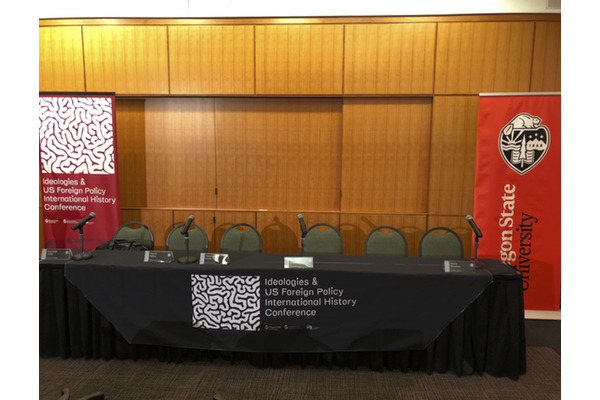
On May 31, 2019, and June 1, 2019, Oregon State University hosted the “Ideologies and U.S. Foreign Policy International History Conference,” organized by Dr. Christopher McKnight Nichols, associate professor of history and director of the Oregon State University Center for the Humanities, by Dr. Danielle Holtz, a post-doctoral fellow at Oregon State University, and Dr. David Milne, a professor of modern history at the University of East Anglia, in Norwich, England. The conference brought together academic and independent historians and political scientists from universities all-round the US and England to discuss the history of ideology and US foreign policy from many different points of view.
The first day of the conference began with introductions from organizers Drs. Nichols, Holtz and Milne. Dr. Nichols, in his introductions, made sure to thank all the major sponsors of the conference, which included Oregon State University, the Richard Lounsbery Foundation, the Carnegie Corporation of New York, Patrick & Vicki Stone, Citizenship & Crisis, the Oregon State University Center for the Humanities, and the Stoller Family Estate. Dr. Nichols also shared with attendees that the essays presented at the conference will, in a near future, became chapters of book that will delineate the state of the field for what he termed the “intellectual history of U.S. foreign policy,” an emerging disciplinary area that he suggested is roughly ten-to-fifteen years old.
Dr. Nichols’ introductory remarks concluded that ideas and ideologies heavily shaped US foreign policy, as affirmed by Michael Hunt in his path-breaking book “Ideology and U.S. Foreign Policy” published in 1987. Dr. Nichols stressed the need for continuous discussions about the intersection of ideology and foreign policy, where Hunt’s book can be used as the frame work for it and for moving beyond that project to build on the vibrant new directions established by recent work on the role of ideas in U.S. foreign relations broadly defined.
Dr. Nichols’ remarks were followed by remarks from Dr. Holtz, who brought to the discussion an emphasis on the ideological clashes in Trump’s White House to reveal how even seemingly non-or-under-ideological Administrations can act ideologically; this, she argued, provides a reason why it is important to evaluate the intersection of ideology and foreign policy historically. She added that Trump’s aggressive posturing when dealing with those who do not agree with him, sign to a state of ideological fragmentation which interferes in how foreign policy is executed. To help frame the multi-day conference and approach to the resulting book Holtz elaborated on philosophical and theoretical approaches to ideologies and ideology critique, drawing on concepts advanced by Louis Althusser, among others. She emphasized that often the historical record reveals that ideological debates are about “a struggle over the obvious,” which was a proposal that seemed to resonate with the audience.
To Dr. Milne, who concluded the introductory remarks, there is a great deal of significance in approaching foreign policy and ideology differently then Michael Hunt, and added the importance of differentiating intentional from accidental ideology. Milne made the case that Hunt’s three-part schema, that focused on “visions of national greatness,” “the hierarchy of race,” and a strong counterrevolutionary impulse – offers a compelling framework to think through the dynamic between ideology and U.S. foreign policy, but not the only one. He asked the contributors and audience: “Does Hunt’s definition function for your intervention or do you opt to define “ideology” differently? What might a theoretical reconfiguration of ideology do to open new avenues of inquiry for historians of ideas and U.S. foreign relations?” Citing numerous examples from the history and from the works of the contributors to the conference, Milne concluded by stating that the “work at this conference represents a broad and diverse series of interventions in the historiography” of U.S. foreign relations. Praising Dr. MichaelaHoenicke Moore’s insights in her chapter, Dr. Milne suggested this historiography “has encouraged essentializing interpretations and a reductionist impulse, searching for and finding recurring and persistent patterns, often promoted through elite culture, marginalizing and dismissing voices and movements that resisted, questioned, and rejected the call to arms.” When reading these papers and listening to the series of talks, he encouraged the audience, it is worth reflecting on the advantages and disadvantages of defining ideology and U.S. foreign relations broadly and of moving beyond what some of the older models of an “ideology-elite-shaped policy” nexus.You can watch the introductory remarks on C-SPAN.
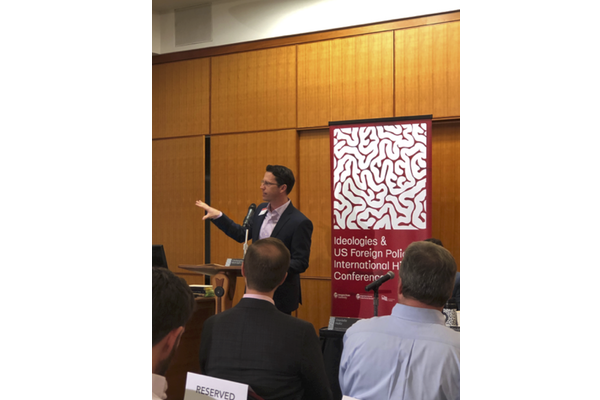
(Dr. Christopher McKnight Nichols Introductory Remarks)
After the introductions, the first panel, moderated by Dr. Nichols, presented papers about “concepts of the subject-state.” Dr. Matthew Kruer, from the University of Chicago, presented an essay called “Indian subjecthood and White Populism in British America,” where he discussed the subjecthood of Indians in relation to the British crown in the 17th and 18th centuries. At that point in history, the crown accepted the Indian tribes in North America as subjects of the Empire while allowing them to keep their sovereignty. The British accepted this arrangement, since in their world view, it was better to have subjects in North America rather than conquered peoples. However, according to Kruer, all this changed in the mid 18th century after certain tribes began to challenge British authority, and white settlers, feeling endangered by the Indians, unprotected by crown, and likely unmoored by being equal to indigenous peoples in the “great chain of being” under the King, massacred Indians. This violence against the Indians were justified by settlers indicating that being equals to Indians threatened their rights as Englishman. This, Kruer argued, was the historical shift from subjects to citizens, it defaulted to western colonial power and as such became a de facto endorsement of white supremacy.
The second essay of this panel was presented by Dr. Benjamin Coates, from Wake Forest University. Under the title “Civilization and American Foreign Policy” Coates traces the historical rhetoric and the complex, and sometimes dualistic meaning of the word “civilization” in the US, from as early as the 18th century, all the way to the present. He shows how it was applied over the decades in the context of the US foreign policy, specially by presidents when addressing the nation, and how the rhetorical meaning of the word morphed to keep up with ideological shifts in US foreign policy championed by US presidents.
The third essay of the panel was presented by Dr. Michaela Hoenicke-Moore, from University of Iowa. The tittle of the essay was “Containing the Multitudes: Nationalism and U.S. Foreign Policy Ideas at the Grassroots Level.” In this essay, Dr. Hoenicke-Moore argues that the voices of the people during and shortly after the Second World War, had very little, to no impact on how the US exercised its foreign policy. She arrived at this conclusion by researching foreign policy from the bottom up. Dr. Hoenicke-Moore does point out in the essay that a great deal of fear mongering was present in the political discourse, but in reality, after the war for instance, few people at the grassroots level, saw the Soviets as enemies, a fact that was largely ignored by those in government. She concludes by adding that, in the end, the elites were able to establish their will, the people at the grassroots levels, were not.
The last essay of this panel was presented by Dr. Mark Bradley, from the University of Chicago, and it was titled “The Political Project of the Global South.” In this essay, Dr. Bradley argues that there is an imaginary global south that cannot fully and completely became an object in foreign policy. Thus, trying to study the global south separately, allows us to see US foreign policy differently, by looking at ideology from a different angle that would eventually bring us back to US history. Dr. Bradley then brings into question continuity and rupture. What is more important? Should continuity, sometimes take the back seat to rupture? He argues that the late 20th century is a time of rupture, a time of change. Not only because of the end of the Cold War, but because of many other structural, economical, and technology changes in the world. By analyzing yearly UN speeches from by world leaders, Dr. Bradley is also able to see the rhetoric used by these world leaders when referring to the global south, concluding that there are changes on the rhetoric about that region of the globe.
After Dr. Bradley’s presentation, the Q&A portion of this panel began. There were several questions and discussions with the panel, starting with a discussion surrounding Michael Hunt’s book and how it directed the research of the panelists. In this respect, the panelists spoke about the intersection of effect and ideology, about power and power relations and how those power relations brought about new social change. The traditional ways of thinking of power was also discussed in the context of Hunt’s book. The discussion then shifted to the lack of grassroots influence in the decisions made by government officials in respect to foreign policy. The panel concluded that grassroots usually is mute in those matters, while elites tend to make their voices heard, and many times are able to get what they are after. The panel ended the Q&A by briefly discussing the rhetoric and the how the word “civilization” is used in the US and in other parts of the world. This ended the morning proceedings.
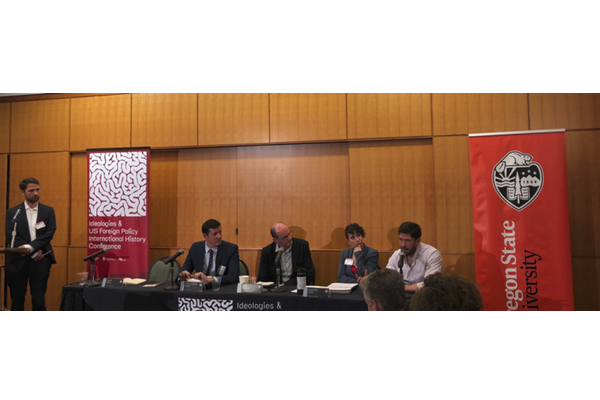
(Doctors David Milne, Marc-Willian Palen, Nicholas Guyatt, Danielle Holtz, and Matt Karpp)
After lunch, the second panel was introduced by the moderator, Dr. David Milne. The theme of the panel was “Concepts of Power” and it kicked off with an essay by Dr. Marc-William Palen, from the University of Exeter, in the United Kingdom. Dr. Palen’s essay was titled “Competing Free Trade Ideologies in the US Foreign Policy.” In the essay, Dr. Palen traces the US free trade ideology and how it shifted in the later 19th century, early 20th century. Dr. Palen separated the trade ideology of the US into three major phases, the Jeffersonianism of the 1840s, which had a protectionist attitude, to the cottonism of the 1900s, and neo-liberalism of the present-day free trade. The freedom to free trade, according to Dr. Palen, has kept the peace, an approach that can be considered radical. The value of free trade has been so high for the US, that support for dictators and other problematic governments have been part of the modus operandi of this country. Free trade has also been a tool for punishments, in the way of increased tariffs for instance, as a shift back to the protectionism of the 19th century, which can be seen in US free trade today.
The next panelist was Dr. Nicholas Guyatt, a reader in North American history at University of Cambridge, in the United Kingdom. Dr. Guyatt’s essay was called “The Righteous Cause: John Quincy Adams and the limits of the American Anti-imperialism.” Dr. Guyatt began his presentation of his essay by quickly explaining the Opium wars in China in 1839. In the Opium wars, the British government went to war with China to force the Chinese into agreeing with trade terms that were beneficial to Britain and terrible for China. The Chinese were incredibly mismatched against a much more powerful British military. This war lasted until 1842. Dr. Guyatt then shows John Quincy Adam’s take of the war. Adams believed that Britain was right in going to war with China, because Britain, in his view, was well within its right to demand such advantageous trade agreements. China, on the other hand, was violating a world order by challenging Britain. Adams was a firm believer in a world order ruled by Christians, which China was not. This points to a world view held by Adams that did not place China in equal footing to white European Christian societies for the world, thus making China a colonialized space, rather than a place with rights. Dr. Guyatt concluded by saying that Adams held a position that the US was exceptional, better than others, and he used the law to get to his objectives, or to justify his positions.
Doctor Guyatt was followed by Dr. Danielle Holtz, a visiting research fellow at Oregon State University. Dr. Holtz’s essay was titled “’An Imaginary Danger’: White Fragility and Self-Preservation in the Territories.” Dr. Holtz traced white fragility and self-preservation to the 1840s debate in Congress involving Florida’s proposal for statehood. In their proposal, Floridians wanted to be able to dictate who could come, and who could live in the state. In other words, they did want the presence of African Americans in the state. Dr. Holtz argued that black bodies meant danger to white southerners, and their presence alone, was enough to trigger an instinct of self-preservation, that was reflected in organizational racism, and later in eugenics. During the presentation of her essay to the panel, Dr. Holtz also compared the 1840s Florida debates in Congress with the current president’s immigration policies that seem to have at its core, the preservation of whiteness.
The panel closed with a presentation by Dr. Matt Karp, from Princeton University. Dr. Karpp’s essay was titled, “Free Labor and Democracy: The Early Republican Party Confronts the World.” Dr. Karpp began the presentation of his essay by talking about his last book, where he wrote about slave holders and US foreign policy, then tied that project to the essay he was presenting. In this essay, he looked at the Republican party of the 1850s as an anti-slavery party, and a threat to the South. Members of the Republican party were a threat to the South’s ideological struggle to maintain free labor viable through slavery, while turning the population of the North against this so important institution.
After Dr. Karpp’s presentation, the Q&A and commentary session for panel two began. The discussion and questions to the panel revolved around the overlap of ideologies in the four different essays, ranging from the John Quincy Adams’ concern with the maintenance of the certain world order, to how power played its part on the works presented. The panelists also discussed how we arrived at the state of “white fragility” that we see today in America, and how science and changes in infrastructure helped in the ideologies mentioned in the panel’s essays.
The final panel of the day was moderated by Dr. Danielle Holtz and had as its theme “Concepts of the International.”
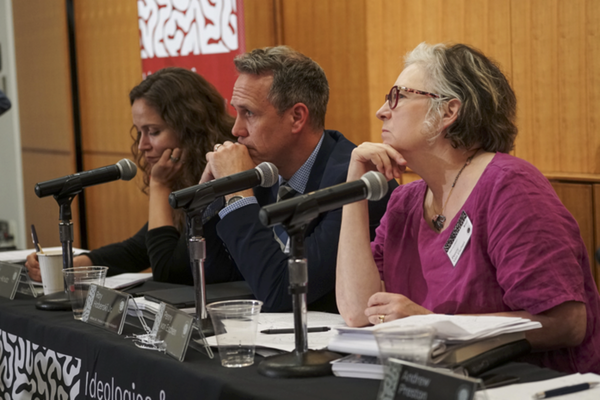
(from left to right, Drs. Emily Cornroy-Krutz, Raymond Haberski Jr., and Penny von Eschen)
The first presenter was Dr. Emily Conroy-Krutz, from Michigan State University. Dr. Conroy-Krutz’s paper was titled, “’For Young People’: Protestant Missions, Geography, and American Youth at the End of the 19th Century.” In this essay Dr. Conroy-Krutz, investigated how religious missionaries talked about Africa at the end of the 19th and beginning of the 20th centuries, and how that rhetoric informed US foreign policy. The essay began in the 1840s, when missionaries saw other peoples of the world as savages. She used an example where a missionary speaks of Hindus as heathen, thus telling the children that were reading this literature, that Hinduism was a horrible religion. However, she shows that by the 1970s, the same missionaries were writing materials for children that showed life in places like Africa, as an adventure, but also as a racist ethnography. Dr. Conroy-Krutz concluded that this “religious intelligence” was transferred into children literature in order to teach adult ideologies to children and to shape how they saw the world.
The next panelist was Dr. Raymond Haberski Jr., from Indiana and Purdue Universities. Dr. Haberski’s essay was titled “Just War as Ideology: The Origins of a Militant Ecumenism.” In this essay, Dr. Haberski shows how religion has been a great part of American identity, and how ideology can be mascaraed by religion. He pointed out that after the Vietnam war, there was a religious crisis that saw the emergence of ecumenical militarism. The ecumenical militarism meant that catholic and evangelical bishops and pastors became the moral compass for the country. Always opposed to the Vietnam war, the catholic bishops, especially after the war, began to question if the US was in moral charge of the world. This debate over the morality of war, ended up influencing foreign policy. This influence, Dr. Haberski concluded, began to appear in foreign policy as “just war” where moral justifications for wars were sought.
Dr. Penny von Eschen, from University of Virginia and Cornell University, followed Dr. Haberski. Her essay was titled “Roads Not Taken: the Delhi Declaration, Nelson Mandela, Vaclav Havel, and the Lost Futures of 1989.” Dr. von Eschen began the presentation of her essay by sharing that it is a result of her research for a new book that talks about the legacies of the Cold War. One of those legacies was the meetings between president George H. W. Bush and Nelson Mandela and Vaclav Havel, and what resulted from those meetings, especially considering the ideological differences between the American president and Mandela and Havel. Dr. von Eschen sees that the breakup of the Soviet Union was a rupture moment in which the US had to establish itself as the only global power, asserting that no other power from the East was to emerge. This was accomplished by using an ideology that normalized violence, especially from those who surrounded president Bush, such as Dick Cheney, Robert Rumsfeld and others. Dr. von Eschen concludes by saying that this ideology was also based on fear from the outside, fear of rogue states, which created and solidified a “us vs. them” ideology.
Dr. Andrew Preston was introduced next. Dr. Preston is from Claire College, University of Cambridge, and his paper was titled, “Fear and Insecurity in US Foreign Policy.” In this essay, Dr. Preston takes on, as the title suggests, fear and insecurities in US foreign policy. He uses the long-standing crisis between the US and North Korea to show how the US goes into moments of panic over tensions in the Korean peninsula, when South Korea, for instance, does not have the same reactions. South Korea, who’s capital Seoul, can be wiped out by North Korean artillery in a moment’s notice, does not share the fear and panic the US shows. Dr. Preston pointed out that, although this fear is very present in US foreign policy, it is not an ideology, but part of the American culture, which could be seen in 1941, and be traced to the present. He concluded by reminding everyone that despite the fears always run high on the US’s part, the situation never really changes.
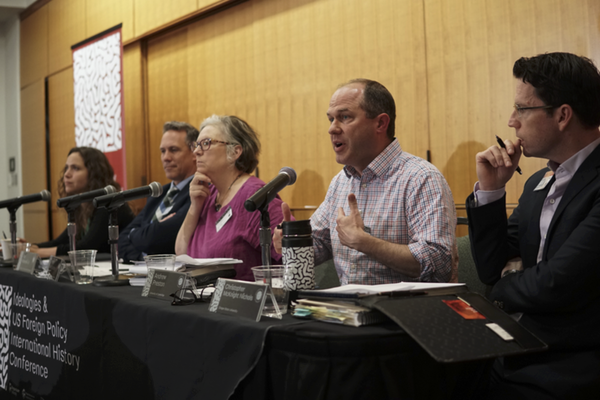
(form right to left, Drs. Emily Conroy-Krutz, Raymond Haberski Jr, Andrew Preston, and Christopher Nichols)
Dr. Christopher Nichols, associate professor of history at Oregon State University closed the presentations of this panel with an essay titled “Unilateralism as Ideology.” In this essay and presentation, Dr. Nichols explored his views about how ideas and ideologies evolve over time, noting his own model as one premised on a vision of punctuated equilibrium. He asserts that the U.S. ideology, from the beginning and with important shifts and pivotal moments, has been defined by a core element of unilateralism. Unilateralism “as ideology” he remarked, was clearly present at the beginning, in the Declaration of Independence and in the nation’s first “Model Treaty” of 1776, designed to minimize U.S. reliance on foreign nations and to steer clear of foreign entanglements by privileging bi-lateral and non-binding agreements. The recent turn to unilateralism, Nichols remarked, is thus not remarkable, nor is it new. Unilateralism is at least evident, if not influential, in virtually all historical debates over international engagement since 1776. This then prompts several questions: Why? Nichols made the case that unilateralism has functions as both ideology and behavior, or tactic, helping a weak nation maneuver in world of larger powers and competing interests at least until the late 19th century. But another question lingers, according to Nichols: Why does or did the U.S. enter into conflicts unilaterally, when it could potentially have benefited more from multilateralism? Dr. Nichols believes the answers to this are in the longer historical record and he asked the audience to help assess them. Unilateralism, as an impulse to place the nation first, has been foundational, linked to Washington, Jefferson, and Monroe, from 1789 through 1823, differentiated at times in terms of the U.S.’s role in the hemisphere versus around the world. In light of the longer patterns in foreign policy thought Nichols sees unilateralist policy ideas as fundamentally a product of a kind of arrogance set on a bedrock of exceptionalism. After giving several examples of unilateral decisions made by the US, from the War of 1812 to WWI, both examples of the U.S. entering conflicts with no formal allies or in terms of being only an “associate power,” even if that one-sidedness came at a great cost, up to the post-9/11 Iraq War, Dr. Nichols concludes that unilateralism is a cultural ideology that revolves around a core calculus about “vital interests” such that foreign policy decisions must always be conceived, evaluated, and implemented on U.S.’s terms.
After Dr. Nichols’ presentation the Q&A session for this panel began with a question about fear in foreign policy, and if it was something unique to the US or generated by fear of potentially losing power. All the members of the panel pondered on these questions, and it seems that there was an agreement that the fear, if not unique, was at least unusual, and likely triggered by the perception that the US’s power was declining, and the country was losing its overall status before the world. A question regarding morality in foreign policy was asked which precipitated the assessment that a morality rhetoric was commonly attached when explaining conflicts where the country was asking its military to kill or to die. Similarly, the morality of unilateralism seemed at stake, too. The Q&A ended with a discussion amongst the panelists about the evangelization of children by using missionary ethnographies, and how it affected future generations, which Dr. Conroy-Krutz and Dr. Nichols discussed in terms of children as “time-shifted adults.” The last bit of discussion was about how a “just war” was used as currency in unifying arguments to justify armed conflicts, particularly in creating a kind of theology of conflict in the wake of the attacks of 9/11.
After the Q&A, the conference was adjourned until 7pm, when keynote speaker James Lindsay presented the talk called “Donald Trump and Ideology,” which was part of the 2018-2019 Governor Tom McCall Memorial Lecture. This lecture will be covered in a separate post.